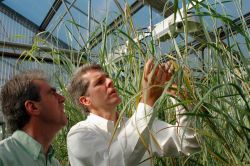Now this is interesting. I was reading earlier this morning in Cadillac Desert about how agriculture in many areas is suffering from water issues that include too much salt. The salt damages the soil, kills the crops and ultimately the land is taken out of production. Today, there are over one billion acres of cropland that have been abandoned around the world and 15 million acres just in the U.S.
However, this may become an issue of the past. Today, Ceres, Inc., a company focusing on the development of energy crops, announced that it has developed a plant that could bring new life to millions of acres of abandoned or marginal cropland damaged by salts. According to the company, results in several of their crop tests, including switchgrass, have shown high levels of salt tolerance.
 Ceres reported that its researchers tested the effects of very high salt concentrations and also seawater from the Pacific Ocean, which contains high concentrations of salts, on energy grass varieties such as sorghum, miscanthus and switchgrass, currently being grown in their greenhouses located in California. These sources of biomass are being considered to produce fuel and electricity.
Ceres reported that its researchers tested the effects of very high salt concentrations and also seawater from the Pacific Ocean, which contains high concentrations of salts, on energy grass varieties such as sorghum, miscanthus and switchgrass, currently being grown in their greenhouses located in California. These sources of biomass are being considered to produce fuel and electricity.
“Today, we have energy crops thriving on seawater alone, said Richard Hamilton, Ceres President and CEO. “The goal of course, is not for growers to water their crops with seawater, but enable cropland abandoned because of salt or seawater effects to be put to productive uses.”
The next step in Ceres’ research is to evaluate energy crops with its proprietary salt-tolerant trait at field scale. Should the results be confirmed, the company says that biofuel and biopower producers will have more choice for locating new facilities, have more productive options for marginal land and ultimately, the ability to displace even greater amounts of fossil fuels.
Hamilton concluded, “In the end, this is not so much a salt trait, but a productivity trait and a land-use trait. I am convinced more than ever that techniques of modern plant science can continue to deliver innovations that increase yields and reduce the footprint of agriculture. Improved energy crops will enable the bioenergy industry to scale far beyond the limits of conventional wisdom.”

